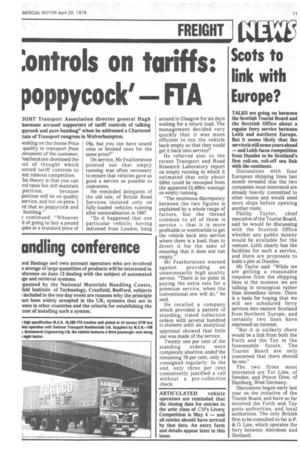:ontrols on tariffs: poppycock' FTA
Page 13

If you've noticed an error in this article please click here to report it so we can fix it.
AIGHT Transport Association director general Hugh herstone accused supporters of tariff controls of talking lpycock and pure humbug" when he addressed a Chartered tute of Transport congress in Wolverhampton.
making on the theme Price quality in transport from viewpoint of the customer, eatherstone dismissed the )01 of thought which )orted tariff controls to 'era ruinous competition. 'he theory is that you can rd l rates but still maintain 'petition, because petition will be on quality service, and not on price. I rd that as poppycock and • humbug."
?„ continued: "Whoever d of going to buy a pound )ples at a standard price of 18p, but you can have sound ones or bruised ones for the same price?"
On service, Mr Featherstone pointed out that empty running was often necessary to ensure that vehicles gave as good a service as possible to customers.
He reminded delegates of the old tale, of British Road Services insisted only on fully-loaded vehicles running after nationalisation in 1947.
"So it happened that one particular vehicle, having delivered from London, hung around in Glasgow for six days waiting for a return load. The management decided very quickly that it was more efficient to run the vehicle back empty so that they could get it back into service!"
He referred also to the recent Transport and Road Research Laboratory report on empty running in which it estimated that only about £48m could be recouped from the apparent' £1,,400m wastage on empty running.
"The enormous discrepancy between the two figures is explained by a whole range of factors, but the thread common to all of them is service – that it is more profitable or worthwhile to get the vehicle back into service where there is a load, than to divert it for the sake of ensuring that it does not run empty."
Mr Featherstone warned against providing an unnecessarily high quality service. "There is no point in paying the extra rate for a premium service, when the conventional one will do," he said.
He recalled a company which provided a pattern of standing, timed collection orders with several hundred customers until an analytical appraisal showed that little use was made of the service.
Twenty one per cent of the standing orders were completely abortive, andof the remaining 79 per cent, only 14 consigned regularly. In the end, only three per cent consistently justified a call without a pre-collection check.












































































































